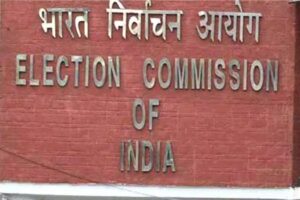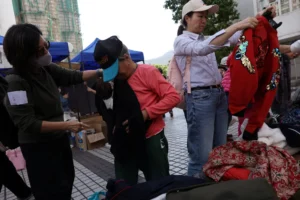
China is scheduled to host a large-scale “Victory Day” military parade on September 3 to mark the 80th anniversary of the end of World War II (referred to in China as the “War of Resistance Against Japanese Aggression.”) China and Japan’s diverging narratives around the war have generated tension between the two countries. The Japanese government has reportedly asked foreign leaders to skip next week’s parade in Beijing due to its alleged anti-Japanese overtones, leading the Chinese government to lodge a protest in response. An article in the Global Times claimed that the Japanese government’s “narrow-minded move undermines [the] correct view of history,” using a state-media stock phrase to describe the CCP’s approved version of history. As James Palmer at Foreign Policy wrote earlier this month, the infatuation with the “correct” view of the war’s history serves mainly to advance the CCP’s interests:
When Beijing’s leaders—such as President Xi Jinping—talk of “safeguarding” the “victory” of World War II, then, they’re talking about defending the idea of the Communist state as the only legitimate inheritor of “China’s victory”—as well as the idea that China, as a victor of the war, enjoys a naturally superior status to Tokyo, the instigator and loser. At home, it means a history that ignores all the messy horrors of the war, and instead tells a safe, party-approved story of moral triumph.
Chinese sacrifices in the war against the Japanese, of course, were enormous. But there’s one particularly thorny problem with Beijing claiming that wartime victory gives it carte blanche: The Nationalist Party did most of the sacrificing. While many communist guerrillas fought heroically, the Communist Party used the opportunity to rebuild itself in its mountain fastness of Yan’an.
And since Russia’s full-scale invasion of Ukraine, China’s arguments have become increasingly linked with justifying Soviet imperialism: As the “principal pillars of resistance,” the Soviets, in this telling, have as natural a right to rule Ukraine as China does to rule Taiwan or Tibet or Xinjiang. China’s war commemorations emphasize a dual partnership between the Soviets and China—a history that was once put on hold for decades thanks to the Sino-Soviet split but is now useful again. [Source]
As Palmer noted, Russia is given a privileged position in this narrative. An article this month in the People’s Daily Online illustrates the nature of this narrative: “A historically accurate view of World War II rests on several fundamental acknowledgments. First, China and the Soviet Union served as the principal pillars of resistance in Asia and Europe respectively.” (The article goes on to criticize those who “ignore incontrovertible historical facts” by “seeking instead to deny or even glorify acts of aggression.”) China’s pro-Russian “neutrality” regarding Russian President Vladimir Putin’s war of aggression in Ukraine, as well as Putin’s likely presence at the parade, is also why European diplomats will reportedly skip the parade. Joseph Torigian, an associate professor at American University, told Reuters: “Putin and Xi take commemoration of the war so seriously because it shows that … Russia and China can take pride in their history and that Western attempts to tarnish their past… will fail,” adding, “World War Two is a foundational moment in the civilisational agendas that Putin and Xi are pursuing.”
The Taiwanese government has also taken exception to the upcoming military parade and other commemorative activities taking place in China. Last week, Taiwan’s Mainland Affairs Council Deputy Minister Shen You-chung called on democratic nations to “boycott and condemn China’s Sept. 3 military parade,” warning that “China may use the […] parade as an occasion to sow division among democracies, and this warrants close attention.” An editorial in today’s Taipei Times also called for a boycott of the parade, citing the CCP’s “historical revisionism” and “distorted narrative” about the war: “By boycotting the parade, the international community can send a clear message: History is not a tool to be rewritten for political gain, and authoritarian regimes cannot whitewash their past to justify their aggressive policies.” Taiwan’s Mainland Affairs Council has reportedly cautioned Taiwanese entertainers with followings in China against “echoing mainland Chinese propaganda.” The council’s head Chiu Chui-cheng warned, “Taiwanese entertainers developing careers in mainland China must abide by cross-strait regulations, be mindful of public perception, and refrain from supporting the Communist Party’s propaganda campaigns – particularly the September 3 military parade.” As in previous years, Taiwanese government employees and senior retired officers are forbidden from attending the military parade.
Leading up to the parade, the CCP has orchestrated a months-long propaganda campaign of nationalist films and other multimedia content to promote its “correct” and “patriotic” view of the war. Chinese internet users who have criticized the anti-Japanese nature of some of this nationalist content have been censored online. At What’s On Weibo, Manya Koetse documented the latest iteration of this content, exemplified by hashtags such as “Netizens Use AI to Talk Across Time and Space with Revolutionary Martyrs” (#网友用AI与先烈跨时空对话#) and “Dialogue with New China Across Time” (跨时空对话新中国). These often feature AI-generated videos of imagined interactions between present-day PLA soldiers and Chinese WWII soldiers, the latter of whom are overcome by emotion upon discovering that China ultimately won the war and became a prosperous country. Koetse highlighted several trends that emerge from this media campaign:
War memory as nationalism. The memory of war, as an important part of popular culture, is being used as a vehicle for China’s new nationalism. This is not unique to China — it can also be seen in other countries, most famously in the US. But the focal points of remembrance shift with the times, as do the main messages surrounding these narratives. Right now, it is increasingly clear that painful war memories are being tied to positive messages about China’s bright future and its role as a great power, moving the emphasis from collective suffering to collective victory.
From national to transnational memory. There is an increasing emphasis on “letting the world know” (让全世界知道那段历史真相) about the Second Sino-Japanese War, especially gruesome chapters such as the Nanjing Atrocities and Unit 731. This reflects frustration that, in the West, the Sino-Japanese War is often taught as “China’s war with Japan” rather than part of the global conflict. As China’s international role grows, so does the drive to reframe these memories as part of world history.
From memory to justice. Hand in hand with the focus on collective suffering, victory, and China’s role in the Second World War, there is also a strong emphasis on past injustices and future justice. These narratives are closely tied to Japan’s official handling of the postwar era, as well as the ongoing denialism and revisionism among Japanese right-wing politicians and netizens. [Source]
In a blog post for the SOAS China Institute this month titled “China’s War Memory and the Politics of Nationalism,” Rahul Pandey summarized the ways in which the CCP’s emphasis on anti-Japanese narratives in its commemoration of the war serve to not only to remind people of history but also to bolster the Party’s claims to legitimacy in the present:
These [commemorative] events function as more than acts of remembrance. They allow the Party to:
1. Reassert its monopoly over historical memory, positioning itself as the defender of national dignity;
2. Foster national unity through shared narratives of trauma and resistance;
3. Respond to contemporary challenges—economic headwinds, rising youth discontent, and external pressure—by invoking patriotic resilience and sacrifice.
In this way, historical commemoration becomes a form of political messaging, aimed at reinforcing regime legitimacy and strengthening ideological cohesion at a time of uncertainty.
[…] The 80th anniversary commemorations of the War of Resistance are more than historical retrospection. They reflect how the CCP actively shapes collective memory to serve present political needs. Through the careful staging of parades, ceremonies, and symbolic acts, the Party reaffirms its role as guardian of the nation’s dignity and architect of its revival. [Source]
The CCP’s “correct” view of the war is also being disseminated internationally, in ways that further advance the Party’s interests abroad. Xinhua hosted a photo exhibition in Minsk, Belarus earlier this month to commemorate the war anniversary and showcase Sino-Soviet bonds of “friendship […] consolidated during the war.” The Chinese Embassy in Morocco held a screening of the new patriotic Chinese WWII film “The Sinking of the Lisbon Maru” this month for an audience of over 60 guests, including Moroccan ministers and other diplomats. In Kenya, China Media Group (CMG) organized an event to commemorate the anniversary with a screening of the same film for over 200 guests from the Kenyan government and civil society. Also at the event, according to an article by the Kenya Broadcasting Corporation (KBC), CMG and KBC signed a memorandum to deepen media cooperation, and one Kenyan student was quoted saying, “We’ve learned a lot from the conversations — the multipolarity of the world and the win-win partnerships that China offers are key takeaways.” Elsewhere, the Chinese Ambassador to Guyana published an article titled “Preserving Historical Memory and Upholding World Peace” in leading Guyanese media outlets, including the Guyana Chronicle, Guyana Times, Kaieteur News, and Stabroek News. The article called not only for “upholding a correct historical view of WWII,” but also “resolutely adhering to the one-China principle.”





